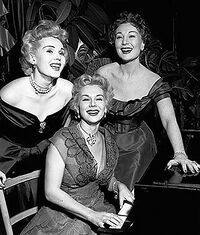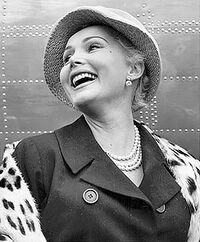Sári Gábor
Sári Gábor | |
|---|---|
 | |
| Born | 5 February 1916 Etra, Alscia |
| Died | 18 December 2016 (aged 100) Velouria, Nerveiík-Iárus-Daláyk, Gylias |
| Occupation |
|
| Known for | Founder of Imperial SA |
| Net worth | Ŧ15 billion (c. 1964) |
Sári Gábor (Gylic transcription: Şari Gabor; 5 February 1916 – 18 December 2016) was a Ruvelkan–Gylian publisher, businesswoman, socialite, and actress. She and her sisters founded Imperial SA, which became Gylias' largest publisher of low-budget potboiler works. Outside of her business career, she was famed for her tongue-in-cheek "wicked" image and extravagant lifestyle.
Early life
Sári Gábor was born on 5 February 1916 in Etra. Her family had fled Ruvelka and had settled in Alscia; they were opposed to the Ruvelkan Socialist Republic and supported the Imperial Separatists during the Ruvelkan Civil War.
She had an older sister, Margit (1915–1997), and a younger sister, Edit (1919–1995). From childhood, she was often nicknamed "Sárit" to match the names of her sisters. They all attended school in Alscia, although only Margit went on to study finance at the Imperial University of Etra.
Career
Acting
Sári's first appearance on stage was in 1934. She and Edit pursued acting careers in earnest, although Sári recalled "it became obvious early on that Edit was more cut out for it."
She appeared in several films produced in the Free Territories.
Her more serious film and television roles practically disappeared in the 1960s as her business career took off. Her subsequent appearances were largely send-ups of her public image.
She was also a regular guest on television shows, including an appearance on What Do I Do? as a mystery guest.
Imperial SA
Sári founded Imperial SA in 1948, together with Edit and Margit. The publishing house specialised in fast-paced, often formulaic, explicitly entertainment-focused works — what would be called pulp fiction, airport novels, or simply potboilers elsewhere.
Sári played a central role in the company as its editor, while Margit assisted with accounting and Edit with arranging illustrations. The sisters avoided the lurid and exploitative tendencies of similar literature, and instead shrewdly capitalised on the spirit of the times, reflecting the prefigurativism of the Free Territories and exuberance of the Golden Revolution. Sári largely devised the ideas and hired others to write the stories, which would be completed by Gauchic illustrations.
Sári embraced her subsequent reputation as the "queen of trash", and nurtured ambitions to be an Arlette Gaubert in the field. Indeed, Imperial wound up dominating the market, consolidating through purchases of competitors. Although the establishment of the National Prices Board deprived them of the ability to charge inexpensive prices, the "cheap" and functional quality remained in their writing, plot points, and short length.
Imperial expanded after the Liberation War, applying its same strategy to other fields: comics, budget albums, and B movies. Several well-known Gylian writers, artists, musicians, and filmmakers began their careers working at Imperial. The company also established a recording studio, Imperial Boardroom, in Landráy, which gained renown in later years.
Public image
Sári cultivated a glamorous image with an extravagant lifestyle to match. As the founder of Imperial SA, she humorously presented herself as a "caricatured capitalist", caring more for books' commercial success than literary merit. She jokingly boasted that despite literature's aspirations to high art, most Gylians owned and read more Imperial books than literary classics. This contributed to her "wicked" image, and imparted a "naughty thrill" to buying Imperial releases.
In film and television, she was known for her thick Ruvelkan-accented English, penchant for calling everyone "dahling", and sly wit, manifested in memorable quips about her private life and her financial success.
She was a supporter of ARENA, and her circle of friends included Şaisa Tausi and Samantha Thompson, and notoriously, Kaþi Mofat. The Nyretak Times commented that "she made her life into a genial joke, and herself into its punchline".
Death
Sári's later life was plagued by health problems, and she spent her last 5 years on life support. She died on 18 December 2016 of cardiac arrest while in a coma in hospital, aged 100.
Private life
Sári was married 9 times, with no children. Repeated marriage was a common trait in the family — Edit was married 5 times, Margit 6 times — and it inspired some of her best-known quips.
She was close to her sisters throughout her life, although their relationship was sometimes competitive. Edit's autobiography criticised her focus on the success of Imperial SA, commenting that "our needs were too often subordinated to Sárit's."

